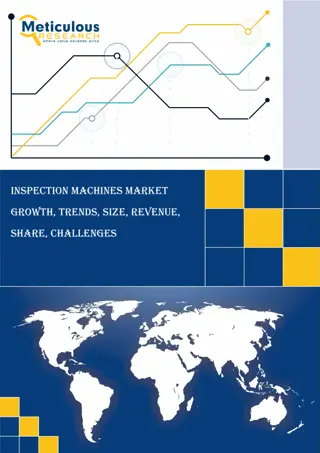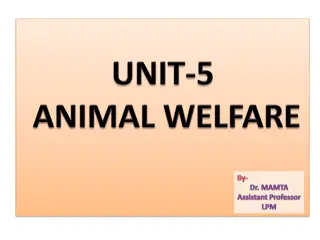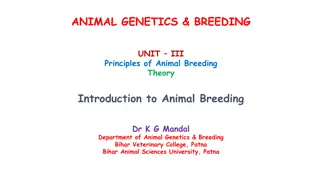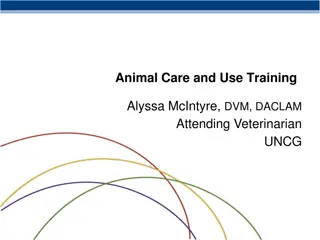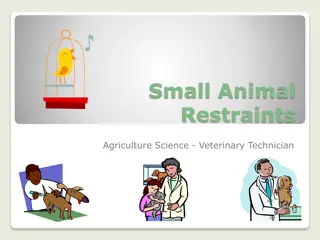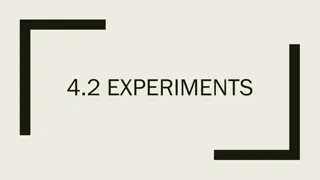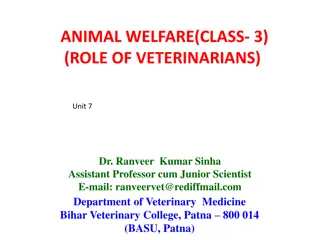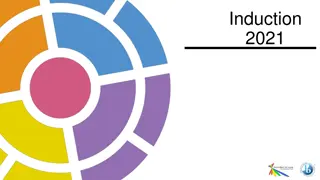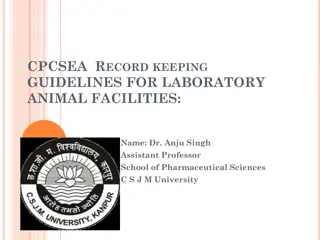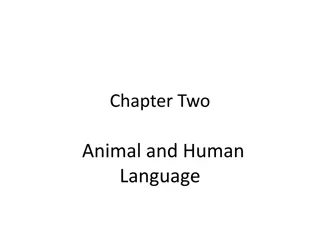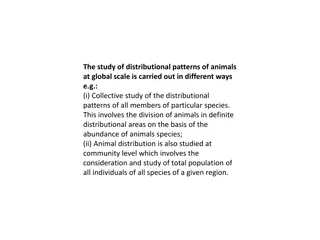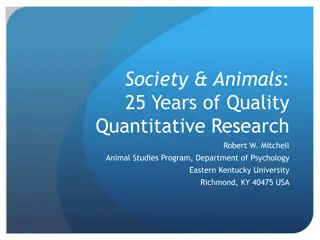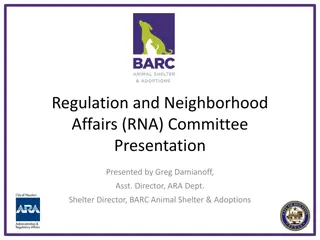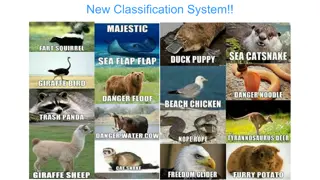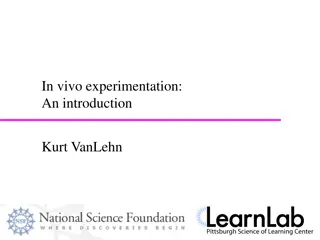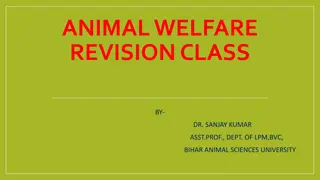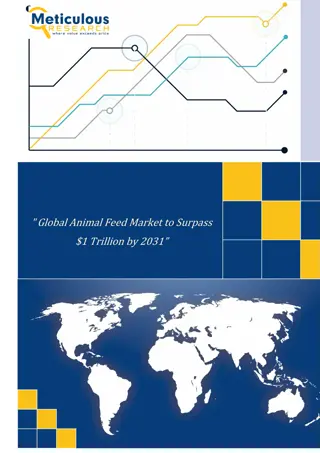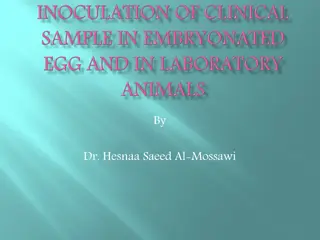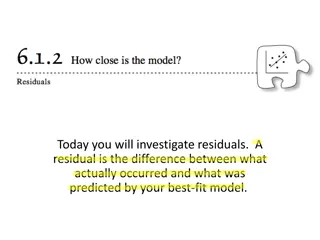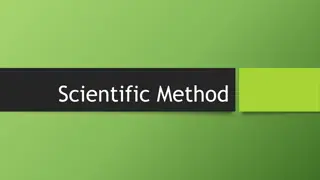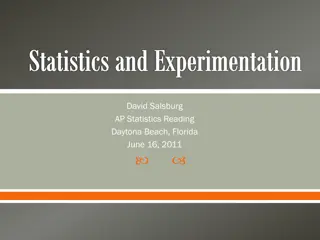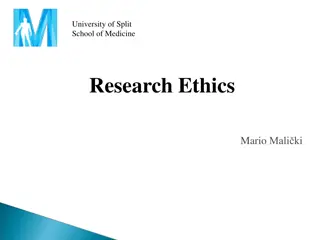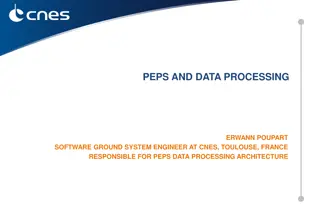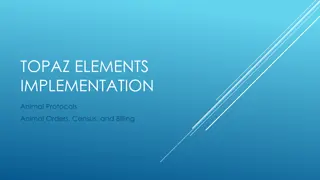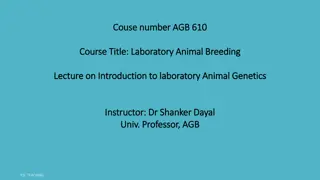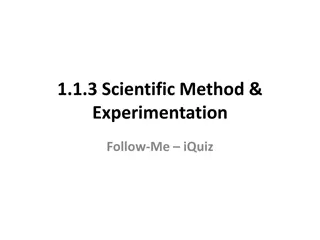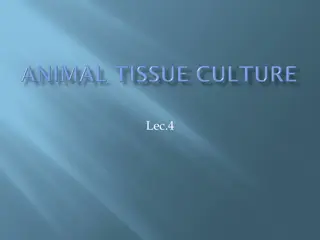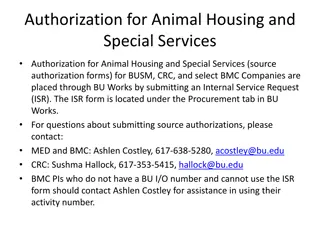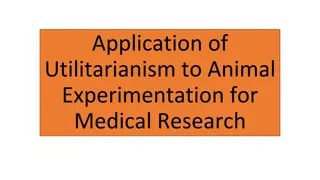Engineering as Social Experimentation: Importance and Learnings
Engineering as social experimentation involves engineers conducting experiments and tests at various stages of product or process design to evaluate outcomes and make necessary modifications. This process is crucial for innovation and improvement in the field of engineering, emphasizing the importan
0 views • 50 slides
History and Educational Programs of DEU Lab Animal Science Department
Established in 2004, the Department of Laboratory Animal Science at Dokuz Eylul University Institute of Health Sciences offers cutting-edge education focusing on animal welfare and ethical practices in scientific research. The department upholds the 3R Principle—Reduction, Refinement, Replacement�
0 views • 9 slides
Responsibilities of Facility Animal Care Committee at McGill University
The Facility Animal Care Committee (FACC) at McGill University oversees animal activities, ensures ethical treatment of animals, and adheres to guidelines from organizations such as the Canadian Council on Animal Care (CCAC). Responsibilities include continual oversight of animals, approving care pr
1 views • 13 slides
Feed Software Market is expected to reach $456.1 million by 2030
The growth of this market is attributed to the adoption of digital technologies and automation in the animal feed industry, the growing animal population, increasing demand for healthy animal-based food products, increasing animal health expenditure and pet insurance, and the growing need to reduce
0 views • 4 slides
Animal Welfare and Ethics: Standards and Regulations in India
The content covers a wide range of topics related to animal welfare, ethics, and laws in India. It delves into the definition of animal welfare, the role of veterinarians, animal welfare organizations, regulations like the Prevention of Cruelty to Animals Act, and protection of wildlife, working ani
0 views • 15 slides
Principles of Animal Breeding: Introduction and Historical Perspective
This unit covers the introduction to animal breeding, the application of genetics principles in breeding, historical perspectives including the work of Robert Bakewell, and key events in animal breeding evolution. Topics include breeding systems, importance of animal breeding, and notable figures in
1 views • 12 slides
Importance of Training in Animal Care and Use for Research
Training in animal care and use is essential to ensure humane and appropriate treatment of research animals, promote regulatory compliance, and uphold high standards of science and animal well-being. The presentation covers the necessity of training, goals including reviewing animal use and identify
0 views • 53 slides
Small Animal Restraints and Safe Handling Practices in Veterinary Technology
Importance of safe practice when working with small animals includes preventing harm, reducing injury, and minimizing stress. Proper animal handling methods and tools are crucial for the safety of both animals and handlers. Common methods of handling different species, demonstrating appropriate anim
1 views • 22 slides
Understanding the Difference: Animal Rights vs. Animal Welfare
Explore the nuanced distinction between animal rights and animal welfare, delving into the ethical considerations, philosophies, and advocacy efforts surrounding these concepts. Discover how animal rights proponents emphasize the equal rights of animals, while animal welfare focuses on humane treatm
0 views • 36 slides
Exploring VCE Art Creative Practice: Research, Experimentation, and Development
Delve into the components of VCE Art Creative Practice including research, exploration of ideas and influences, experimentation with materials and techniques, and development of artworks. Discover how artists creatively express personal, cultural, and social influences through visual language and in
0 views • 55 slides
Understanding Experiments in Research: Observation vs. Experimentation
Observation and experiments are two crucial methods in research. An observational study involves observing and measuring variables without influencing responses, while an experiment deliberately applies treatments to measure responses. Confounding variables can affect the results, and factors like e
0 views • 13 slides
Role of Veterinarians in Animal Welfare
Veterinarians, especially with the increasing number of female professionals in the field, play a crucial role in promoting animal welfare through daily practices, advocacy, education, and research. They are involved in various sectors like biomedical, wildlife, and farm animal research, as well as
3 views • 10 slides
Exploring Animal Management and Sociology in Education
Discover the intersection of animal management and sociology in education through a comprehensive course structure that covers topics ranging from animal welfare and ethics to practical husbandry. Dive into the significance of animal care in the UK economy and learn about various career paths in thi
2 views • 19 slides
Laboratory Animal Facilities Record-keeping Guidelines
Guidelines for maintaining records in laboratory animal facilities include provisions for animal housing, staff records, health monitoring, and standard operating procedures. Compliance with CPCSEA regulations ensures ethical review procedures for animal research proposals. Focus is on providing a s
6 views • 11 slides
Understanding Allergies to Animals and Living Organisms
Allergies to animals and living organisms are a result of specific immune processes triggered by allergenic substances like proteins and peptides. This allergic response can be caused by various animal proteins such as dog allergens Can f.1, Can f.2, and Can f.3, and cat allergen Fel d1. The represe
1 views • 10 slides
Uniqueness of Human Language and Communication Contrasted with Animal Communication
Human language possesses unique properties such as reflexivity, displacement, and arbitrariness, setting it apart from animal communication. These distinctions enable humans to communicate abstract concepts, discuss past and future events, and use arbitrary linguistic forms. The contrast between hum
1 views • 17 slides
Understanding Global Animal Distribution Patterns
The study of animal distribution patterns at a global scale involves analyzing species abundance and diversity in specific areas. Factors like environmental conditions, latitudes, and evolutionary history influence animal distributions. There are horizontal and vertical zones of animal distribution,
1 views • 25 slides
Exploring Human-Animal Interactions through 25 Years of Quality Research
Delve into the interdisciplinary realm of human-animal interactions with a focus on social sciences and quantitative research. Discover key themes such as social psychology, therapy, animal welfare, and more. Explore attitudes and personality differences related to animal treatment, empathy, and bel
1 views • 26 slides
BARC Animal Enforcement Programs and Protocols
BARC Animal Enforcement is responsible for addressing dangerous, aggressive, and nuisance dog cases in the community. Through a structured priority matrix and enforcement tools, BARC aims to ensure public safety and animal welfare. The process involves investigation, designation determination, and c
0 views • 15 slides
SASAS Strategic Plan Vision 2025 - Summary and Objectives
The SASAS Strategic Plan Vision 2025 aims to develop capacity in animal science to enhance animal production systems sustainably, promote welfare, job creation, and poverty alleviation. Informed by local, regional, and global imperatives, it aligns with the National Development Plan 2030, African Un
0 views • 11 slides
Exploring the Evolution of Animal Classification
Unveil the fascinating world of animal classification with a new system, delving into the definition of animals, informal groups, key events in animal evolution like symmetry and germ layers, embryological development of protostomes and deuterostomes, tissues formation, body cavity types, and cephal
0 views • 34 slides
Overview of In Vivo Experimentation in Educational Research
This introduction to in vivo experimentation by Kurt VanLehn covers the motivation and definition of in vivo experiments, examples, distinguishing features from other experiments, and popular experimental methods like laboratory and classroom experiments. The content addresses the need for external
0 views • 46 slides
Exploring the Creative Practice in VCE Art: Research, Experimentation, and Development
Dive into the world of VCE Art Creative Practice with a focus on research, experimentation, and development. Discover how artists explore and interpret personal, cultural, and social influences through visual language. Uncover the process of researching ideas, materials, and techniques, as well as e
0 views • 41 slides
Understanding Animal Welfare and Ethics in Veterinary Practice
Animal welfare is about ensuring the well-being of animals by providing proper care, treatment, and humane handling. It involves considering their physical and mental needs, preventing suffering, and promoting ethical treatment. Veterinarians play a crucial role in upholding animal welfare through d
0 views • 14 slides
Global Animal Feed Market to Surpass $1 Trillion by 2031,
Animal Feed Market Size, Share, Forecast, & Trends Analysis by Type (Compound Feed, Roughages), Source (Plant, Animal, Novel), Form (Dry (Pellets), Wet), Animal Type (Poultry, Ruminants (Beef, Dairy Cattle), Swine, Aquaculture) - Global Forecast to 2
0 views • 5 slides
Animal Systems in Virology: A Comprehensive Overview
The images and content highlight various aspects of utilizing animal systems in virology research, including procedures, recognition of illnesses, and the limitations of using animal models. It discusses the significance of animal systems in understanding viral infections and vaccine safety, as well
0 views • 16 slides
COVID-19 Task Success Survey: Experimentation and Results Analysis
Task success survey conducted during the COVID-19 pandemic to assess visitor tasks and satisfaction levels. Phases included survey design assessment and ongoing refinement. Experimentation with variations revealed insights on the impact of asking about satisfaction first, completion rates, and corre
0 views • 22 slides
Proposed Playing Rules for Experimentation by SCPR - Historical Perspective and Principles
Experimentation and proposal of playing rules by the SCPR, focusing on fairness, skill enhancement, player responsibility, and spectator engagement. Historical perspective of rule changes in Gaelic Football highlighted from 1990 to 2016.
0 views • 11 slides
Investigating Residuals in Packaging Experimentation
Explore the concept of residuals by analyzing a cereal packaging experimentation conducted by Battle Creek Cereal. Understand how residuals indicate the variance between actual and predicted values. Delve into scenarios where residuals are large or small, interpreting their significance in practical
0 views • 9 slides
Understanding the Scientific Method and Its Application in Science
Science, derived from the Latin word for knowledge, is a blend of reasoning and factual information. It hinges on observation, experimentation, and the quest for natural explanations. There are no absolute truths in science; our comprehension of nature stems from observation. Two primary scientific
0 views • 27 slides
Experimentation and Results in Statistics: Lessons from Past Studies
The content discusses historical experiments in statistics, focusing on the mistakes and outcomes of studies like the Lanarkshire Milk Study. It showcases how experiments can go astray due to factors like inadequate sampling, measurement biases, and human intervention. The narrative emphasizes the i
0 views • 27 slides
Exploring Research Ethics in Human Experimentation and History of Bioethics
Delve into the complexities of research ethics, focusing on human and animal experimentation, environmental ethics, and publication ethics. Learn about the critical evaluation of dilemmas in research, research integrity, and the moral code of academia. Understand the definition of research with huma
0 views • 41 slides
Effective Strategies to Prevent Teen Drug Use
This content emphasizes the importance of starting conversations about drug use with teens at a young age, as statistics show that experimentation typically begins around the age of 12. It also highlights the impact of parental behavior on teens' choices and suggests redirecting teens towards their
0 views • 32 slides
Insight into PEPS Data Processing Architecture by Erwann Poupard
Erwann Poupard, a Software Ground System Engineer at CNES, Toulouse, France, plays a crucial role in the PEPS data processing architecture. The outline covers PEPS HPSS data storage statistics, current data processing trends, and future plans including PEPS V2 development. Explore PEPS processing ch
0 views • 8 slides
Upgrading to TOPAZ Elements: Enhancing Animal Protocols, Orders, Census, and Billing
The Animal Resource Facility (ARF) and Office of Animal Care Compliance (OACC) are shifting to TOPAZ Elements, a comprehensive web-based system, to streamline management of animal protocols, orders, census, and billing. This upgrade aims to provide better oversight for PIs, enhance compliance with r
0 views • 8 slides
Understanding Laboratory Animal Genetics and Research Importance
This course (AGB 610) delves into the realm of laboratory animal breeding, exploring the significance of using animals in research and teaching. Dr Shanker Dayal, a distinguished professor, guides students through lectures on animal genetics and the common uses of laboratory animals. The course emph
0 views • 14 slides
Understanding the Scientific Method and Experimentation
This interactive quiz explores the scientific method and experimentation process, including formulating hypotheses, conducting experiments, and analyzing results. It highlights key concepts such as hypothesis development, testing, and publishing results. Test your knowledge and deepen your understan
1 views • 50 slides
Understanding Animal Tissue Culture and Cell Line Production
Animal tissue culture involves growing tissues separate from the animal in a laboratory setting. To achieve exponential cell growth, cells are converted into immortal cell lines. The production of a cell line involves steps like breaking cell adhesion, incubation, and transferring cells to fresh med
0 views • 22 slides
Authorization for Animal Housing and Special Services Process Guidelines
The guidelines outline the process for authorizing animal housing and special services at BUSM, CRC, and select BMC Companies through BU Works via Internal Service Requests (ISR). Investigators must submit ISR forms for animal housing at the Animal Science Center, monitor charges, and provide advanc
0 views • 8 slides
Ethics of Animal Experimentation in Medical Research
Exploring the application of utilitarianism to animal experimentation for medical research, this content delves into the history of vivisection, animal rights activism, and the work of historical figures like Claudius Galen in advancing medical understanding through dissection. The ethical considera
0 views • 17 slides



